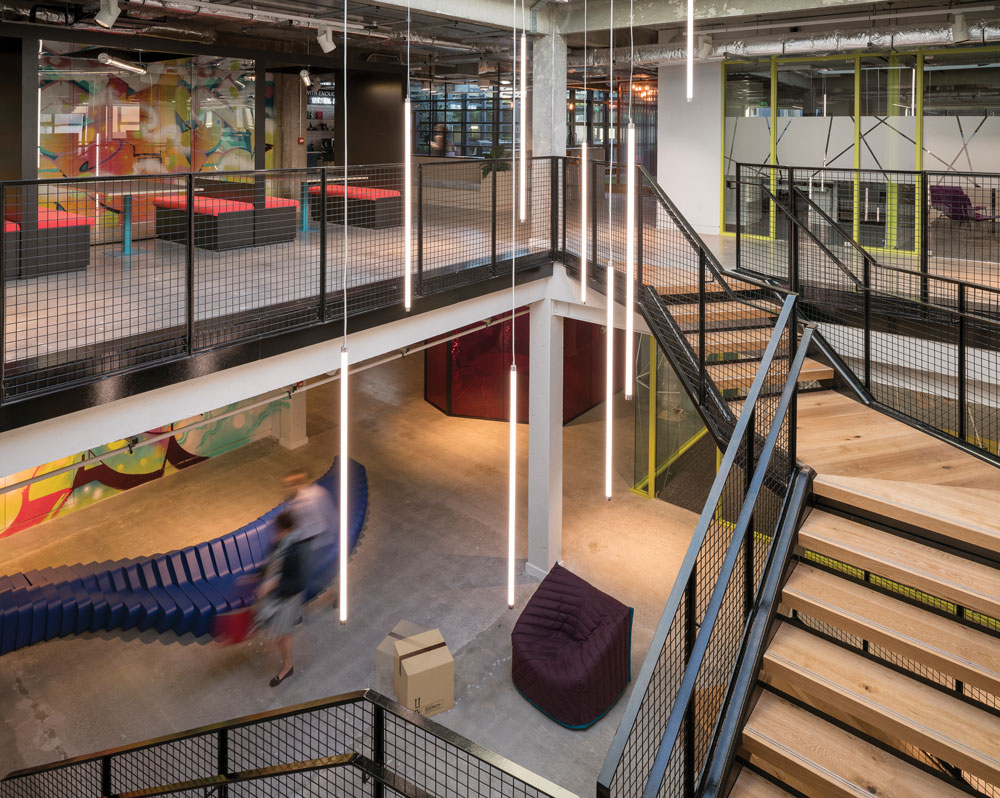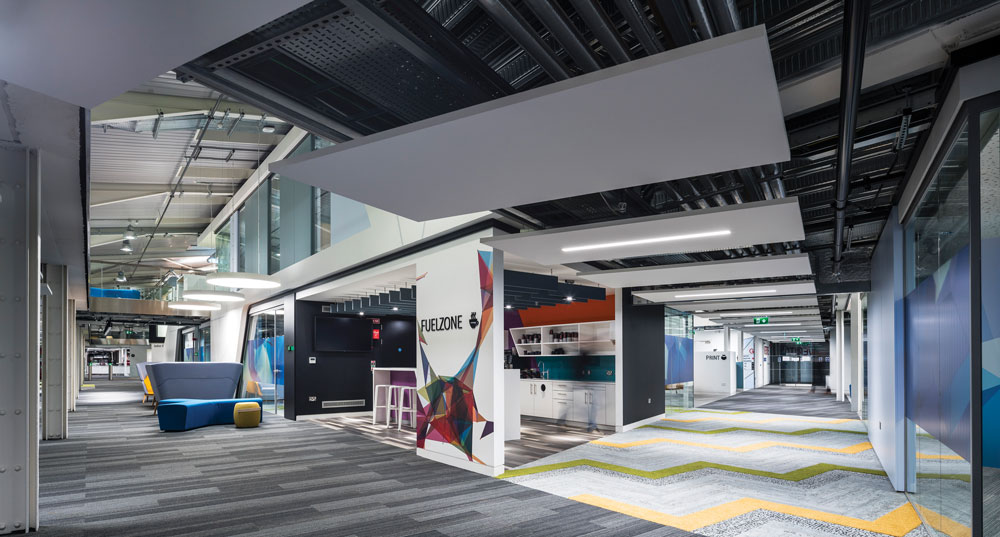Tech Boom: Ireland’s Reign as Tech Firm Hub
 Go to https://stobuildinggroup.com/wp-content/uploads/2018/03/2867_073D.jpg
Go to https://stobuildinggroup.com/wp-content/uploads/2018/03/2867_073D.jpg
Amazon. Apple. Facebook. Google. LinkedIn. Each of these technology superstars has a significant hub in Ireland. And that’s just to name a few.
Why Ireland, a small island nation with roughly the same size population as the Houston metro area, known for its scenery and cozy pubs?
“Originally it had to do with the low corporate tax rate. But it’s much more than that now,” says Richard Hemming, Structure Tone’s preconstruction and business development director in Dublin. “We’re an English-speaking country on the doorstep of Europe with a young population, strong economy, reliable infrastructure and pro-business environment. Add all of those factors together and it becomes quite compelling.”
After the first few big tech firms set up shop in and around Dublin, a cluster of cosmopolitan young talent developed. Other tech companies noticed, opting not only to follow that talent but also to capitalise on Dublin’s available office stock and robust economy—the second most competitive in the European Union, according to IDA Ireland.
GREAT MINDS THINK ALIKE
Part of that economy includes the real estate and construction community, which, says RKD Interiors director, Justin Treacy, is perfectly suited to the way tech firms operate. “Companies in Ireland tend to be agile and flexible, including consultants and contractors,” he says. “So when tech companies started coming here and needed to move quickly, our market adapted to service that, which can be hard to find elsewhere in Europe.”
Structure Tone Dublin’s managing director James Reidy agrees.
“These are sophisticated, forward-thinking companies. You have to be a flexible, intelligent, team player who understands that these firms want to hit the ground running.”
From the construction perspective, says Reidy, that flexibility that also requires becoming part of their development and visioning process. “We often join in on design workshops and discussing lessons learned,” he says. “These clients have a number of key performance indicators for things like sustainability, and we often help them test those out.”
This quest to find new and better ways is inherent in the tech industry, says Catherine Murphy, associate director at Irish project management firm KMCS. “There is always a drive to find the newest, most inspiring way to fit out a building, a way to create biophilic spaces that connect the environment to the workplace,” she says. “Most tech companies also provide the agile decision making which allows concepts to develop and architects to translate those ideas into wonderful, progressive spaces.”
 Go to https://stobuildinggroup.com/wp-content/uploads/2018/03/2437_061D.jpg
Go to https://stobuildinggroup.com/wp-content/uploads/2018/03/2437_061D.jpg
CULTURE SHOCK
In addition to its effect on the Irish economy, the tech sector has certainly made its mark on Ireland’s business culture. Even industries known for their formal, conservative nature have followed tech’s lead when it comes to office design and supporting employee productivity.
“What the tech sector brought to the workplace is an authenticity and mindfulness around enabling people to do good work,” says Treacy. “Everyone has realised the way people work isn’t necessarily process-driven. It’s more about allowing creativity and collaboration and creating an inclusive environment.”
That doesn’t mean the Irish offices of established financial institutions are adding slides and ping pong tables. But they are shifting away from a more deliberately hierarchical layout, whether it’s adopting an open-plan design, trading the traditional board room for more casual meeting spaces or reserving the top floors of their building for shared social areas rather than executive offices.
“Very corporate organisations were never going to adopt all the wacky stuff tech firms were doing in the beginning,” Treacy says. “But once that subsided, we saw a convergence where the tech sector matured to a point where more traditional companies were looking at those collaborative, inclusive environments and seeing that they work.”
That focus on collaboration has also brought holistic employee wellness to the surface. KMCS project manager Fiona Mullalley says many of the wellness features now found in all kinds of workplaces started at tech firms. “Tech companies are at the forefront in providing the likes of mothers’ rooms, quiet and sleep rooms, music rooms, bars, gyms, massage rooms, personal trainers and more,” she says. “It’s all in the quest to achieve a better market share and attract and provide the best working and downtime space for employees.”
The global nature of these businesses means connectivity is also key, no matter their industry. Tech firms, of course, have substantial technology infrastructure needs, but now so do the offices of any global firm, from in-house IT networks for day-to-day operations to the complex database and software systems necessary to serve their clients.
“We’ve seen some large US-based financial companies relocate their IT operations to Ireland,” Reidy says. “Those offices are entirely based on technology. Plus, they want the collaborative spaces, kitchen areas, breakout rooms, video conferencing and so on of any modern office.”
SPREADING THEIR WINGS
While tech firms tend to drive trends like open plans and collaborative spaces, those features are likely here to stay no matter which industry becomes the next big influencer. In the near future, what an office looks like may be less important than where it is, says Treacy.
“The tech center has mostly congregated in certain parts of Dublin, but that may change,” he says. “We’re starting to see a bit of a move to suburban areas, thanks in part to a maturing workforce who still want to work close to home but can’t afford to live with a family in city centre.”
In fact, some companies have already migrated out to smaller cities like Cork, Galway and Letterkenny. If Ireland wants to maintain its sought-after status, it simply needs to keep up its reputation for flexibility and creativity, Reidy says. “You just don’t know who will be the next big occupier. We want to keep executing, be the best in class and keep serving our clients, no matter their size.”
